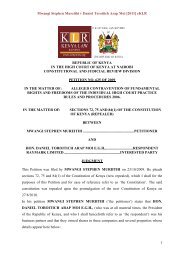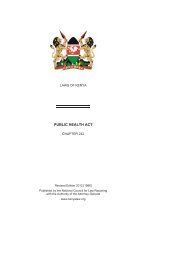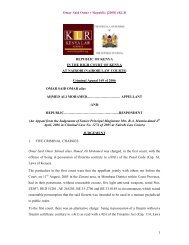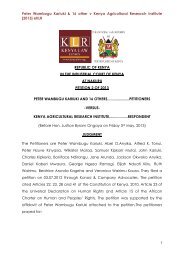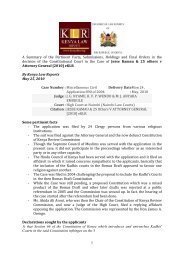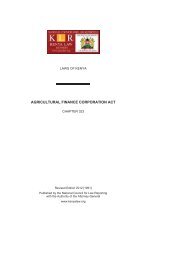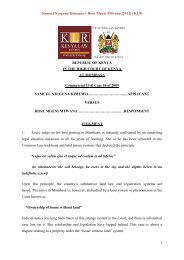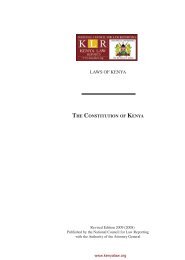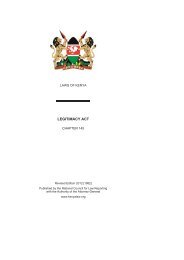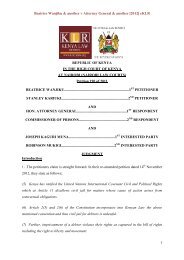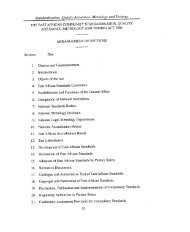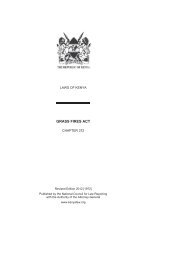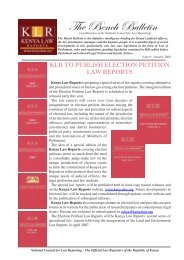Joseph Kimani Gathungu v Attorney General & 5 others - Kenya Law ...
Joseph Kimani Gathungu v Attorney General & 5 others - Kenya Law ...
Joseph Kimani Gathungu v Attorney General & 5 others - Kenya Law ...
- No tags were found...
Create successful ePaper yourself
Turn your PDF publications into a flip-book with our unique Google optimized e-Paper software.
<strong>Joseph</strong> <strong>Kimani</strong> <strong>Gathungu</strong> v <strong>Attorney</strong> <strong>General</strong> & 5 <strong>others</strong> [2010] eKLRREPUBLIC OF KENYAIN THE HIGH COURT OF KENYAAT MOMBASAConstitutional Reference 12 of 2010JOSEPH KIMANI GATHUNGU………………………………APPLICANT-VERSUS-1. THE ATTORNEY-GENERAL.........................................RESPONDENTS2. INTERNATIONAL CRIMINAL COURT3. KITUO CHA SHERIA……………………….1 ST INTERESTED PARTY4. CENTRE FOR JUSTICE FOR VICTIMS OFCRIMES AGAINST HUMANITY........……..2 ND INTERESTED PARTY5. LAW SOCIETY OF KENYA…………….....3 RD INTERESTED PARTY6. INDEPENDENT MEDICO-LEGALUNIT...4 TH INTERESTED PARTYKENYA SECTION, INTERNATIONALCOMMISSION OF JURISTS…………..................….AMICUS CURIAERULINGA. FRAMEWORK AND BACKGROUNDThe applicant moved the Court by Originating Notice of Motion dated and filed on 22 ndSeptember, 2010, brought under Articles 1,2,3,23,159-170 (inclusive), 258 and 259 of theConstitution of <strong>Kenya</strong>, 2010 and Sections 1A, 1B and 3A of the Civil Procedure Act (Cap. 21,<strong>Law</strong>s of <strong>Kenya</strong>).1
<strong>Joseph</strong> <strong>Kimani</strong> <strong>Gathungu</strong> v <strong>Attorney</strong> <strong>General</strong> & 5 <strong>others</strong> [2010] eKLRThe application is an indictment of the recently-launched operations of the InternationalCriminal Court in <strong>Kenya</strong>, in the aftermath of an outbreak of violence and consequentialdestruction of human life, following the general elections of December, 2007.In the package of national reforms initiated to restore peace and establish social and politicalsafety-nets, a central pillar was the new Constitution, which was approved by referendum, andpromulgated in a grand ceremony on 27 th August, 2010. It is this Constitution, and theattendant institutions, that the applicant extols, as he questions the legality of the currentinvestigative activities of the International Criminal Court.B. CONTESTING THE LEGALITY OF THE INTERNATIONAL CRIMINALCOURT’S ACTIVITIES: THE APPLICANT’S PRAYERSThe applicant’s prayers are set out as follows:(1) “THAT the Court be pleased to declare that the involvement ofthe 2 nd respondent in the affairs of <strong>Kenya</strong> in general, and in particular inthe investigations and possible prosecutions of the perpetrators of thepost-2007 general-elections [violence] violates Articles of theConstitution of <strong>Kenya</strong> and, therefore:(a) THAT the 2 nd respondent be ordered not to involveitself in the investigations of post-2007 <strong>Kenya</strong>n generalelections; and(b) THAT 2 nd respondent be ordered not to prosecute any<strong>Kenya</strong>n in the International Criminal Court on account of anyacts or omissions resulting from the acts of violence perpetratedduring and after the 2007 general elections in <strong>Kenya</strong>”.(2) “THAT the Court be pleased to order that full investigations becarried out by the relevant organs of the <strong>Kenya</strong> Government in respect ofthe violence that occurred during and after the 2007 general electionsand all other incidents of violence commonly referred to as ‘tribalclashes’ particularly in 1992 and in 1997 and for all the perpetrators of2
<strong>Joseph</strong> <strong>Kimani</strong> <strong>Gathungu</strong> v <strong>Attorney</strong> <strong>General</strong> & 5 <strong>others</strong> [2010] eKLRsuch crimes, if any, to be prosecuted in the constitutionally-establishedCourts in <strong>Kenya</strong>”.(3) “THAT this Court be pleased to declare that 2 nd respondent’sacts of investigating and threatened prosecutions of any <strong>Kenya</strong>n in theInternational Criminal Court contravenes the constitutional provisionsand, as such, that such acts of the 2 nd respondent are null and void andof no legal consequence; and further, that the agreement signed betweenthe respondents on or about 3 rd September, 2010 far exceeds the statutoryprovisions contained in the International Crimes Act, 2008 and, withoutprejudice to the above prayers, the said agreement should be declarednull, void and of no legal consequence”.The grounds founding the application, for the material part, may be thus set out:(i) that, following the post-election mediation initiatives of former UNSecretary-<strong>General</strong> Dr. Kofi Annan, the Waki Commission recommendedresort to the process of criminal justice, failing which the names of some tensuspects kept in a sealed envelope would be handed over to Dr. Annan toplace before the International Criminal Court – and in the end the sealedenvelope was so handed over;(ii)that, as the contemplated local trial process did not takeplace, the sealed envelope was ultimately passed on to the ICC Prosecutor,Mr. Luis Moreno-Ocampo who has subsequently visited <strong>Kenya</strong> several timesand “takes every opportunity to threaten that, very soon, he shall be placingat least two <strong>Kenya</strong>ns [before]…the ICC to face criminal charges relating tothe post- 2007 general elections”;(iii) that, on 4 th August, 2010 <strong>Kenya</strong>ns, by popular vote, approvedthe then proposed new Constitution; this Constitution was later promulgatedon 27 th August, 2010 and “has dramatically changed literally all aspectsof…..<strong>Kenya</strong>’s way of life”, with notable aspects being –(a) all sovereign power is vested in the people;(b) all judicial authority is vested in the people, but thepeople have delegated that authority to be exercised on theirbehalf by the Supreme Court, the Court of Appeal, the High3
<strong>Joseph</strong> <strong>Kimani</strong> <strong>Gathungu</strong> v <strong>Attorney</strong> <strong>General</strong> & 5 <strong>others</strong> [2010] eKLRCourt, the Magistrate’s Court, local tribunals, and KadhiCourts;(c) any person who purports to exercise a power notexpressly conferred upon him or her by the said Constitution,acts in vain, and such actions are null, void, and wanting inlegal and moral authority;(d) any <strong>Kenya</strong>n has the right to approach the Court toensure the rule of law reigns supreme;(iv) that, the International Criminal Court (ICC) is not providedfor in the Constitution as an organ capable of either investigating any crimesoccurring in <strong>Kenya</strong> or hearing and determining the guilt or innocence of anysuch alleged criminals; and, notwithstanding that the ICC is part of the lawof <strong>Kenya</strong>, the Constitution is the supreme law of the land and theConstitution does not recognize the ICC as a competent Court in <strong>Kenya</strong>;(v)that, to allow the ICC to operate in <strong>Kenya</strong> violates the letterand spirit of the Constitution; and it “amounts to surrender of thesovereignty of <strong>Kenya</strong> to foreigners which is totally untenable”;(vi) that, whereas the Constitution provides for a separation ofpowers, the legislature making laws, the Executive investigating crimes andproviding security, the Judiciary hearing and determining issues of rights ofsubjects including trial rights – the ICC has assumed investigative,prosecutorial and adjudicatory roles all running together, and this violatesthe rules of natural justice and, ipso facto, offends the spirit of theConstitution;(vii) that, whereas by Chapter 10 of the Constitution of <strong>Kenya</strong> alljudicial authority is derived from the people and is exercised by Courts andtribunals established thereunder, the ICC, under that Constitution, “isneither a Court nor a tribunal that has been established”; andnotwithstanding that under <strong>Kenya</strong>’s International Crimes Act, 2008 (Act No.16 of 2008) the ICC was authorized to operate in <strong>Kenya</strong>, yet, on account ofArticles 159, 160, 161, 162 and 169 of the Constitution, it was necessary after4
<strong>Joseph</strong> <strong>Kimani</strong> <strong>Gathungu</strong> v <strong>Attorney</strong> <strong>General</strong> & 5 <strong>others</strong> [2010] eKLR(c) The domain of the Executive and the domain of theJudiciaryCounsel urged that the prayers sought by the applicant could not be granted, becausethey confounded the proper roles, respectively, of the Executive Branch and the JudicialBranch: matters relating to foreign States and international organizations (such as the ICC)belong to the Foreign Affairs docket of the Executive, which is the better judge in that regard,than the Judicial Branch; and it is the Executive, rather than the Judiciary, which will haveready access to information relating to the recognition process in respect of internationalorganizations; the arrangement regarding power and privilege for the ICC under the RomeStatute, was a matter falling more within the Executive’s competence than that of theJudiciary.(d) National and international jurisdictionMr. Njiru submitted that the Rome Statute had special provisions on the jurisdiction of theICC: Article 119 (1) provides:“Any dispute concerning the judicial functions of the Court shall be settled by thedecision of the Court.”Counsel urged that <strong>Kenya</strong>, as a party to the Rome Statute, had committed herself to the termsof Article 119 on jurisdiction.The issue of jurisdiction was considered by the Appeals Chamber of the InternationalTribunal for the Prosecution of Persons Responsible for Serious Violations of InternationalHumanitarian <strong>Law</strong> Committed in the Territory of Former Yugoslavia since 1991, inProsecutor v. Dusko Tadic a.k.a “Dule”, Decision of 2 nd October, 1995; and the basicprinciple was explicated as follows (at p. 5):“This power [to determine own competence], known as the principle of ‘Kompetenz-Kompetenz’ in German or ‘la compétence de la compétence’ in French, is part, andindeed a major part, of the incidental or inherent jurisdiction of any judicial orarbitral tribunal, consisting of its ‘jurisdiction to determine its own jurisdiction’. Itis a necessary component in the exercise of the judicial function and does not need7
<strong>Joseph</strong> <strong>Kimani</strong> <strong>Gathungu</strong> v <strong>Attorney</strong> <strong>General</strong> & 5 <strong>others</strong> [2010] eKLRto be expressly provided for in the constitutive documents of those tribunals,although this is often done…….”Mr. Njiru submitted that since the ICC does indeed have powers to determine its ownjurisdiction, this was not a matter for the High Court of <strong>Kenya</strong>: and consequently, this Courtlacks jurisdiction to entertain the applicant’s case, especially considering that the ICC hadauthorised the commencement of the investigations taking place in <strong>Kenya</strong>. The Pre-TrialChamber II of the ICC, after deliberations, made its compétence de la compétence ruling on31 st March, 2010, as follows:“Thus, on the basis of the available information examined, the Chamber concurswith the prosecutor that the alleged crimes against humanity occurred on theterritory of the Republic of <strong>Kenya</strong>, for which reason the Court’s jurisdiction (rationeloci) under article 12(2)(a) of the Statute is satisfied” (Situation In the Republic of<strong>Kenya</strong>, March 31, 2010 (No. ICC – 01/09), para. 178).Counsel submitted that since the ICC was a judicial organ with the competence tomake binding decisions and issue orders, its decision on jurisdiction was now res judicata,and the High Court had no jurisdiction to decide the question; and if the applicant had a validapplication to make, he would have to bring it before the ICC. In this respect, counselsubmitted, <strong>Kenya</strong>’s State organs had their positions defined in Article 12 (1) of the RomeStatute, which provides:“A State which becomes a Party to this Statute thereby accepts the jurisdiction of theCourt with respect to the crimes referred to in article 5”.The crimes referred to in the said Article 5 are: the crime of genocide; crimes againsthumanity; war crimes; the crime of aggression. In relation to such crimes, learned counselsubmitted, States parties to the Rome Statute had agreed to cede some of their jurisdiction oncrime.(e) International law in the context of theConstitution of <strong>Kenya</strong>, 2010Starting from the terms of Article 2(5) of the Constitution, that –“The general rules of international law shall form part of the law of <strong>Kenya</strong>”,8
<strong>Joseph</strong> <strong>Kimani</strong> <strong>Gathungu</strong> v <strong>Attorney</strong> <strong>General</strong> & 5 <strong>others</strong> [2010] eKLRMr. Njiru urged that the two relevant institutions, the ICC [Article 1 of the Rome Statute] andthe Assembly of States Parties [Article 112 of the Rome Statute] form part of the law of<strong>Kenya</strong>; and that on this account, the ICC did become a functional Court in <strong>Kenya</strong>, once thetreaty became operational in <strong>Kenya</strong>, ruling out the need for new local legislation. Such aposition is further assured by the enactment in <strong>Kenya</strong> of the International Crimes Act, 2008(Act No. 16 of 2008), section 4(1) of which states that –“The provisions of the Rome Statute……shall have the force of law in <strong>Kenya</strong>….”By virtue of the International Crimes Act, 2008, counsel submitted, the ICC became a<strong>Kenya</strong>n Court, in respect of the crimes named in Article 5 of the Rome Statute: the crime ofgenocide; crimes against humanity; war crimes; the crime of aggression.By this interface of the national and the international criminal-law jurisdiction,counsel urged that <strong>Kenya</strong>, in its complexion of criminal jurisprudence, had adopted the“monist” typology, dispensing with the need for a specific domestication of internationallaw. While the International Crimes Act, 2008 introducing the operation of the Rome Statute,entered into force on 1 st January, 2009, the Constitution, which was promulgated on 27 thAugust, 2010 carries a transitional clause [Sixth Schedule, clause 7(1)] which stipulatesthat:“All law in force immediately before the effective date [27 th August, 2010] continuesin force and shall be construed with the alterations, adaptations, qualifications andexceptions necessary to bring it into conformity with this Constitution”.(f) Is the Applicant’s case endowed with locus standi?Learned counsel Mr. Buti, for the <strong>Law</strong> Society of <strong>Kenya</strong> [3 rd Interested Party] submitted thatthe appellant lacked the locus standi to contest the competence of the ICC to conduct itsoperations in relation to the incidents of post-election violence.In the first place, the ICC itself determines the preliminary question of jurisdiction;this is clear from Article 19 (1) of the Rome Statute which provides:“The Court shall satisfy itself that it has jurisdiction in any case brought before it.”Secondly, by Article 17 of that Statute. “the Court shall determine that a case isinadmissible where:9
<strong>Joseph</strong> <strong>Kimani</strong> <strong>Gathungu</strong> v <strong>Attorney</strong> <strong>General</strong> & 5 <strong>others</strong> [2010] eKLR(a) The case is being investigated or prosecuted by a State which hasjurisdiction, unless the State is unwilling or unable genuinely to carry outthe investigation or prosecution……”Although the terms of Article 17 give room for a party to challenge the jurisdiction ofthe ICC on the admissibility of a particular case, Mr. Buti submitted that the applicant hereinlacked the locus to make such a challenge, for the Statute specifies the categories of personswho may make such a challenge. Article 19(2) of the Statute provides:“Challenges to the admissibility of a case on the grounds referred to in article 17 orchallenges to the jurisdiction of the Court may be made by:(a) An accused or a person for whom a warrant of arrest or a summons toappear has been issued under article 58;(b) A State which has jurisdiction over a case, on the ground that it isinvestigating or prosecuting the case or has investigated or prosecuted; or(c) A State from which acceptance of jurisdiction is required under article12.”Mr. Buti submitted that the applicant herein did not fall within the category of personsrecognized as entitled to contest either the general jurisdiction of the ICC, or its jurisdiction toadmit a particular case for investigation and/or prosecution.Lack of locus standi for the applicant was also attributed to the fact that no trial datehad been set by the ICC, in relation to <strong>Kenya</strong>’s post-election violence; and so it was not timeyet for any challenge to be made by virtue of Article 19(2) of the Rome Statute.(g) Is the ICC in conflict with the national judicialorder?Responding to the preliminary objections, learned counsel, Mr. Gikandi for the applicant,submitted that the ICC lacks the competence to involve itself in <strong>Kenya</strong>’s judicial domain, adomain which takes notice of local circumstances, such as: the emergence since the postelectionviolence, of a new Republic founded on the Constitution of <strong>Kenya</strong>, 2010; theemergence of a new legal framework based on the shifted grundnorm; the re-alignment of theinterplays of the country’s organs of governance, in the aftermath of the post-election10
<strong>Joseph</strong> <strong>Kimani</strong> <strong>Gathungu</strong> v <strong>Attorney</strong> <strong>General</strong> & 5 <strong>others</strong> [2010] eKLRviolence; the new source of moral direction for organs of governance – “We the people of<strong>Kenya</strong>”; new directions of national sovereignty.Counsel submitted that the vital question raised by the applicant was: the InternationalCriminal Court even when seen as embedded in the International Crimes Act, 2008 – is itsuperior to, or subject to the Constitution? The latter was the answer, as counsel urged; forArticle 1(1) of the Constitution provides that “All sovereign power belongs to the people of<strong>Kenya</strong> and shall be exercised only in accordance with this Constitution”, and “the peopledon’t share the sovereign power with the ICC…”; this sovereign power is delegated to namedState organs, namely Parliament, the Executive, the Judiciary and Independent Tribunals.Mr. Gikandi urged that, by Article 2(1) of the Constitution, the said Constitution “isthe supreme law of the Republic and binds all persons and all State organs”; that “the ICC andany other person cannot claim to exercise any part of the governance authority”; and thatsince, by Article 2(4) of the Constitution, “any law, including customary law, that isinconsistent with this Constitution is void to the extent of the inconsistency”, the RomeStatute if inconsistent with the Constitution, is invalid. So strongly cast in learned counsel’sperception, was this doctrine on the Constitution; he insisted that all counsel espousing thealternative view had fallen into a misapprehension, insofar as they had equated the RomeStatute with the Constitution; he invoked Article 3(1) which provides that: “Every person hasan obligation to respect, uphold and defend this Constitution”. So, contesting the submissionthat the applicant would appear more as a busybody, as he lacked locus standi, Mr. Gikandiurged that the applicant was in compliance with Article 3(1), and was, on the contrary,defending the Constitution.Mr. Gikandi urged that the Constitution as promulgated on 27 th August, 2010 was theformula for guaranteeing fair hearing in justiciable matters; and he invoked that concept asprovided for in Article 50 of the Constitution:“50. (1) Every person has the right to have any dispute that can be resolved by theapplication of law decided in a fair and public hearing before a court or, ifappropriate, another independent and impartial tribunal or body.(2) Every accused person has the right to a fair trial, which includes the right -(a) to be presumed innocent until the contrary isproved;b) to be informed of the charge, with sufficient11
<strong>Joseph</strong> <strong>Kimani</strong> <strong>Gathungu</strong> v <strong>Attorney</strong> <strong>General</strong> & 5 <strong>others</strong> [2010] eKLRdetail to answer it;(c) to have adequate time and facilities toprepare a defence;(d) to a public trial before a court establishedunder this Constitution;(e) to have the trial begin and conclude withoutunreasonable delay…….”Mr. Gikandi urged that the framework for a fair trial is guaranteed by the foregoingprovisions, but not by non-national regimes such as that exemplified by the ICC.Counsel submitted that, by Article 159(1) of the Constitution, “Judicial authority isderived from the people and vests in, and shall be exercised by, the courts and tribunalsestablished by or under this Constitution”; and that by Articles 163, 164 and 165 theConstitution had established a Supreme Court, a Court of Appeal and a High Court, operatingon the basis of several dedicated enactments, for the delivery of justice as ordained by theConstitution. On those foundations, counsel postulated that the High Court, for instance,cannot be devoid of jurisdiction; so it stood to question, whether the ICC had been vestedwith a higher jurisdiction. Mr. Gikandi submitted that since the ICC was not mentioned in theConstitution, it followed that, that Court had not emerged from Article 169 of theConstitution, by virtue of which Parliament could establish Subordinate Courts, and vestthem with jurisdiction.(h) Where national law meets international lawThe interplay between national law and international law was the main issue taken up by Mr.Njiru in his response. Counsel called for judicial notice of the fact that the <strong>Kenya</strong>n State, justlike any other State, has no autonomous existence outside the framework of the community ofnations; and that on this account, her regime of law and her constitutional order, interface withthose of other States under the over-arching umbrella of international law; and the beaconsof international law take different forms, one of these being the multilateral treaties to which<strong>Kenya</strong> and other States are parties; the Rome Statute is one of such treaties, and it establishesthe International Criminal Court to prosecute and to judge, in the event of the commission ofcertain named categories of offences. Counsel urged that there was no gainsaying the12
<strong>Joseph</strong> <strong>Kimani</strong> <strong>Gathungu</strong> v <strong>Attorney</strong> <strong>General</strong> & 5 <strong>others</strong> [2010] eKLRsupremacy of the Constitution of <strong>Kenya</strong> territorially, even as one acknowledges that thepeople of <strong>Kenya</strong>, in respect of whom sovereignty is expressed, have acknowledged expresslythe role of international law in <strong>Kenya</strong>.Learned counsel, Mr. Justus Munyithya for the 1 st Interested Party (Kituo Cha Sheria)expressed agreement with Mr. Njiru, and called for attention to Article 2(5) and (6) of theConstitution of <strong>Kenya</strong>, 2010; Article 2(5) thus stipulates:“The general rules of international law shall form part of the law of <strong>Kenya</strong>”;and Article 2(6) provides:“Any treaty or convention ratified by <strong>Kenya</strong> shall form part of the law of <strong>Kenya</strong>under this Constitution”.Mr. Munyithya urged that the foregoing provisions aptly covered the current ICCactivities in <strong>Kenya</strong>, in respect of the destruction wreaked by the post-election violence of2007 and 2008. Counsel urged that the Rome Statute under which the ICC operates, is wellanchored in <strong>Kenya</strong>’s regime of constitutional law.Learned counsel Mr. Buti for the <strong>Law</strong> Society of <strong>Kenya</strong> (3 rd Interested Party),submitted that the interface of the national and the international regime flowed both ways;apart from being expressly declared by the Constitution of <strong>Kenya</strong>, 2010, it was affirmed too,in the tenth preambular declaration of the Rome Statute, with the States Parties –“Emphasizing that the International Criminal Court established under this Statuteshall be complementary to national criminal jurisdictions”.Mr. Buti submitted that the evidence of such complementarity of the <strong>Kenya</strong>n and theRome Statute criminal-law regimes was further reaffirmed in <strong>Kenya</strong>’s International CrimesAct, 2008 which bears a tell-tale preamble in the following terms:“AN ACT of Parliament to make provision for the punishment of certaininternational crimes, namely genocide, crimes against humanity and war crimes,and to enable <strong>Kenya</strong> to co-operate with the International Criminal Court establishedby the Rome Statute in the performance of its functions”.The foregoing line of argument was adopted also by learned counsel Mr. Otieno,representing the <strong>Kenya</strong> Section of the International Commission of Jurists which had beenadmitted to the proceedings herein, in the capacity of amicus curiae. Mr. Otieno submittedthat the Republic of <strong>Kenya</strong> had assumed responsibility under certain international treaties andconventions; and that the governing law in respect of such obligations, is that <strong>Kenya</strong> is not to13
<strong>Joseph</strong> <strong>Kimani</strong> <strong>Gathungu</strong> v <strong>Attorney</strong> <strong>General</strong> & 5 <strong>others</strong> [2010] eKLRrun its domestic affairs in a manner that derogates from them. This well-established principleis expressed, for instance, in Advisory Opinion OC – 14/94 of 9 th December, 1994:International Responsibility for the Promulgation and Enforcement of <strong>Law</strong>s in Violation ofthe Convention (Arts. 1 and 2 of the American Convention on Human Rights) [Requestedby the Inter-American Commission on Human Rights]; and the pertinent passages may be setout here:(i)“35. International obligations and the responsibilities arising from thebreach thereof are another matter. Pursuant to international law, allobligations imposed by it must be fulfilled in good faith; domestic law maynot be invoked to justify non-fulfilment. These rules may be deemed to begeneral principles of law and have been applied by the Permanent Court ofInternational Justice and the International Court of Justice even in casesinvolving constitutional provisions…..These rules have also been codified inArticles 26 and 27 of the 1969 Vienna Convention on the <strong>Law</strong> of Treaties”.(ii)“50. The Court finds that the promulgation of a law that manifestlyviolates the obligations assumed by a State upon ratifying or acceding to theConvention constitutes a violation of that treaty and, if such violation affectsthe guaranteed rights and liberties of specific individuals, gives rise tointernational responsibility for the State in question.”(i) Post-Election Violence in <strong>Kenya</strong> 2007-2008: Does thisproperly fall to the jurisdiction of the ICC?The answer of counsel for the respondents and the Interested Parties is, Yes; and this is alsothe position taken by the amicus curiae. Learned counsel found validation in that standpointfrom facts recorded in the proceedings of the ICC’s Pre-Trial Chamber II, dated 31 st March,2010 [No. ICC – 01/09]; the Pre-Trial Chamber addresses the principle of complementarity inthe national and international criminal jurisdiction, and thus states [para.53]:“53. With respect to complementarity, the Chamber underlines that the first stepconcerns the absence or existence of national proceedings. Article 17(1)(a) of the[Rome] Statute makes clear that the Court ‘shall determine that a case isinadmissible where: (a) The case is being investigated or prosecuted by a State14
<strong>Joseph</strong> <strong>Kimani</strong> <strong>Gathungu</strong> v <strong>Attorney</strong> <strong>General</strong> & 5 <strong>others</strong> [2010] eKLRwhich has jurisdiction over it, unless the State is unwilling or unable genuinely tocarry out the investigation or prosecution’. In its judgment of 25 th September, 2009the Appeals Chamber interpreted this provision as involving a twofold test:‘[I]n considering whether a case is inadmissible under article 17(1) (a) and(b) of the Statute, the initial questions to ask are (1) whether there areongoing investigations or prosecutions, or (2) whether there have beeninvestigations in the past, and the State having jurisdiction has decided notto prosecute the person concerned. It is only when the answers to thesequestions are in the affirmative that one has to look to the second halves ofsub-paragraphs (a) and (b) and to examine the question of unwillingnessand inability. To do otherwise would be to put the cart before the horse. Itfollows that in case of inaction, the question of unwillingness or inabilitydoes not arise; inaction on the part of a state having jurisdiction (that is, thefact that a State is not investigating or prosecuting, or has not done so)renders a case admissible before the Court, subject to article 17(1) (d) of theStatute’.”In that context the Pre-Trial Chamber reviewed the facts on the ground in <strong>Kenya</strong>, andstated (para.183) that: “since there is a lack of pending national proceedings against ‘thosebearing the greatest responsibility for the crimes against humanity allegedly committed’, theProsecutor submitted the possible case(s) to arise from his investigation into the situation‘would be currently admissible’”; and on that basis, the Chamber:“authorizes the commencement of an investigation into the situation in the Republic of<strong>Kenya</strong> in relation to crimes against humanity within the jurisdiction of the Courtcommitted between 1 st June, 2005 and 26 th November, 2009”.D.JUSTICIABILITY, JURISDICTION, CONSTITUTION: IS THE APPLICATIONTENABLE IN LAW? – A FINAL ASSESSMENTWhether or not the International Criminal Court has jurisdiction to operate in <strong>Kenya</strong>, is aquestion addressed with focus by counsel for the respondent, the Interested Parties and theamicus curiae; they are in agreement that an international tribunal such as the ICC is wellrecognized to have compétence de la compétence – an initial capacity to determine whether15
<strong>Joseph</strong> <strong>Kimani</strong> <strong>Gathungu</strong> v <strong>Attorney</strong> <strong>General</strong> & 5 <strong>others</strong> [2010] eKLRor not it has the jurisdiction to hear and determine a case coming up before it. Counsel submitthat the ICC, acting within the terms of the Rome Statute, has already determined that itindeed has jurisdiction. The ICC has gone further to determine the second jurisdictionalquestion: whether the special facts of post-election violence in <strong>Kenya</strong> (2007-2008) render thematter justiciable before that Court. The ICC has determined that, on the facts, it hasjurisdiction to investigate, hear and determine the cases arising from the post-electionviolence.Such submissions, in my opinion, are well grounded in point of law, and I have notfound them qualified by the applicant’s contentions.The main thrust of the applicant’s case, at this stage, is that <strong>Kenya</strong>’s new Constitution[promulgated on 27 th August, 2010] has instituted an iron-clad judicial set-up, emanatingfrom the sovereign will of the local electorate, which peremptorily rules out any role for theICC, in redressing any criminal acts occurring in <strong>Kenya</strong>. Learned counsel, Mr. Gikandi hasacclaimed the genius of the new Constitution, and has extolled its organic linkage to thesovereignty of the people, urging that insofar as this Constitution does not expressly providefor the Rome Statute which establishes the ICC, the ICC forms no part of <strong>Kenya</strong>’s criminaljustice system and its operations merely offend the Constitution. Counsel, hence, urged that itis apposite, and is a triable question, to challenge the ICC’s presence in <strong>Kenya</strong>, as theapplicant seeks to do by the Originating Notice of Motion of 22 nd September, 2010.Prior to the 27 th August, 2010 <strong>Kenya</strong>’s governance was based on the Constitution of1969, which incorporated sweeping amendments effected over a five-year period, to theoriginal Independence Constitution of 1963. I take judicial notice that, whereas the 1963Constitution was an elaborate document marked by delicate checks-and-balances to publicpower, the 1969 Constitution had trimmed off most of these checks-and-balances,culminating in a highly centralized structure in which most powers radiated from thePresidency, stifling other centres of power, and weakening their organizational and resourcebase,in a manner that deprived the electorate of orderly and equitable procedures of access tocivil goods. Judicial notice is taken too of the fact that the Constitution of 2010 derived itscharacter, by a complex and protracted law-making process, from the history of populargrievance associated with the limitations of the earlier Constitution. It is not surprising, in thecircumstances, that the applicant has founded his claim, at least in part, in his faith in the newconstitutional order.16
<strong>Joseph</strong> <strong>Kimani</strong> <strong>Gathungu</strong> v <strong>Attorney</strong> <strong>General</strong> & 5 <strong>others</strong> [2010] eKLRIt emerges from the submissions of counsel appearing before the Court, that whetherunder the 1963 or the 1969 or the 2010 Constitution, <strong>Kenya</strong> remains a member of thecommunity of nations, and subject to the governing law bearing upon States as members ofthat community.Therefore, the Constitution of 2010 is not to be regarded as rejecting the role ofinternational institutions such as the ICC. Indeed, from the express provisions of theConstitution, “the general rules of international law shall form part of the law of <strong>Kenya</strong>”;and <strong>Kenya</strong> remains party to a large number of multilateral international legal instruments: andso, by law, <strong>Kenya</strong> has obligations to give effect to these. One of such Conventions is theRome Statute which establishes the International Criminal Court. Such evidence as isexpressed in the documents filed before this Court, shows that <strong>Kenya</strong> has not declined toabide by the terms of the applicable instruments of international law.A scrutiny of the several Constitutions <strong>Kenya</strong> has had since Independence shows that,whereas the earlier ones were designed as little more than a regulatory formula for Stateaffairs, the Constitution of 2010 is dominated by a “social orientation”, and as its maintheme, “rights, welfare, empowerment”, and the Constitution offers these values as thereference-point in governance functions. Such a public-values orientation, in my opinion,readily interfaces with the objectives of international law, such as are integrated in the RomeStatute, as regards intractable crimes such as those of genocide, war crimes, and crimesagainst humanity.<strong>Kenya</strong>’s new Constitution requires those exercising judicial authority to be guided,inter alia, by the “principles of the Constitution” [Article 159 (2) (e)], and such principles aredefined in Article 10 (2) (b) as –“human dignity, equity, social justice, inclusiveness, equality, human rights, nondiscriminationand protection of the marginalized”.Such values, in the conviction of this Court, are unlikely to be given fulfilment by <strong>Kenya</strong>acting in isolation, or on the basis of mere invocations of the positive aspects of theConstitution; it is essential for the due fulfilment of those principles, and in the instant matter,to recognize and facilitate the role of the International Criminal Court acting within theframework of the Rome Statute.17
<strong>Joseph</strong> <strong>Kimani</strong> <strong>Gathungu</strong> v <strong>Attorney</strong> <strong>General</strong> & 5 <strong>others</strong> [2010] eKLRTherefore, in my judgment, the applicant’s challenge to the operations of the ICC hasno legal foundation, apart from invoking a jurisdiction which is not available. The matterraised by the applicant is, in my opinion, not justiciable.The preliminary objection on points of law, thus, succeeds; and I hereby dismiss inlimine the applicant’s Originating Notice of Motion of 22 nd September, 2010.Orders accordingly.DATED and DELIVERED at MOMBASA this 23 rd day of November, 2010.J. B. OJWANGJUDGECoram: Ojwang, J.Court Clerk: IbrahimFor the Applicant: Mr. GikandiFor the 1 st Respondent: Mr. J. OndariFor the 1 st Interested Party: Mr. Justus MunyithyaFor the 2 nd Interested Party: Mr. B. NjiruFor the 3 rd Interested Party: Mr. Buti; Mr. <strong>Joseph</strong> MunyithyaFor the 4 th Interested Party: Mr. <strong>Joseph</strong> MunyithyaFor Amicus curiae: Mr. Otieno18



